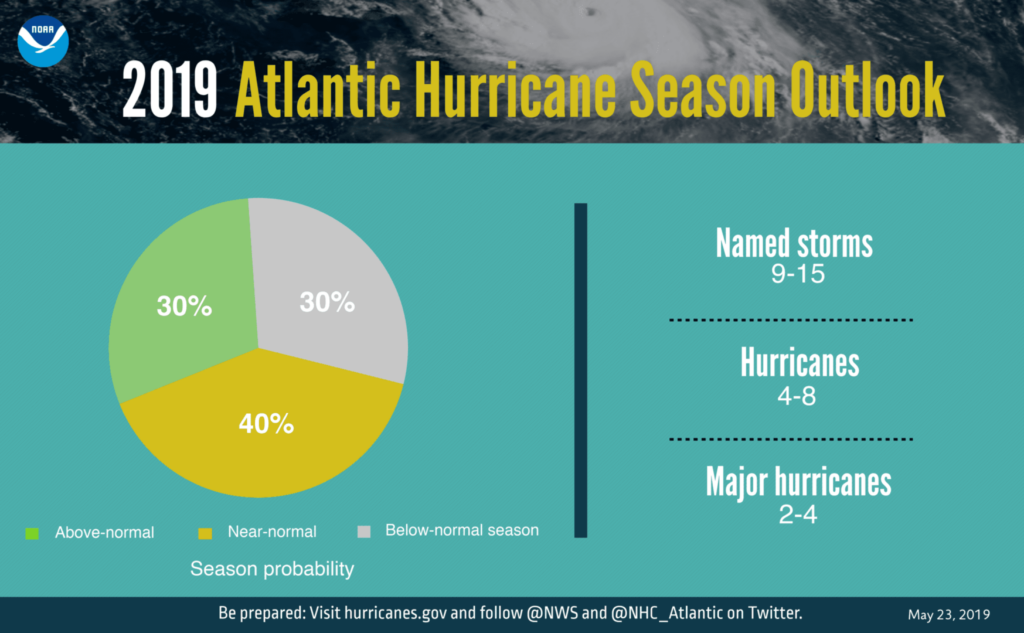NORTH HAVEN, Conn. — Chief Januszewski and the North Haven Fire Department are recommending a series of precautions in the event of a tropical storm or hurricane in the coming weeks and months.
The Atlantic Hurricane Season began on June 1 and will end on Nov. 30. Historically, the peak season for hurricanes and tropical storms is mid-August through October, according to Connecticut’s Division of Emergency Management and Homeland Security (DEMHS).
The National Oceanic and Atmospheric Administration (NOAA) is predicting a near normal hurricane season this year, which could produce between nine and 15 storms. Between two and four of those storms are predicted to be major hurricanes.
“It’s a good idea to sit down with your family to create a plan in the event of a hurricane,” Chief Januszewski said. “Families should know what they need to do, where to go and how to find each other. Doing what you can to prepare for severe weather ahead of time protects your family and ensures you’re able to quickly and safety reunite after a weather emergency.”
DEMHS has several safety tips for residents in the event of a hurricane or tropical storm in the area:
Before a Hurricane
- Stay informed by signing up for local emergency alerts.
- Have a plan for your family including children, loved ones with functional needs and pets. Establish meeting locations, create an emergency contact plan, plan how to evacuate and learning how to shelter in place. Practice your plan with your entire family.
- Prepare an emergency kit.
- Familiarize yourself with hurricane evacuation routes in your area. Determine where you would go and how you would get there if you needed to evacuate.
- Trim trees and shrubs around your home to make them more wind resistant. Clear clogged rain gutters and downspouts. Bring in all outdoor furniture, decorations, garbage cans, and anything else that is not tied down.
- Take photos or videos of your possessions to create a record for insurance purposes.
During a Hurricane
- Stay tuned to the radio and your local news station for official weather information.
- Follow all instructions and advice given by emergency officials.
- Stay indoors during a hurricane and away from windows and glass doors. Close all interior doors. Secure and brace all exterior doors.
- Take refuge in a small interior room, closet, or hallway on the lowest level of your residence.
- If you live in a mobile home, plan to leave. Mobile homes are unsafe in high winds.
- Do not attempt to evacuate during the height of a hurricane. You are safer batten down in your home than out on the road where flying debris can be hazardous.
After a Hurricane
- Continue to listen for the latest updates on the radio and your local news station regarding extended rainfall and subsequent flooding after the hurricane has ended.
- If you evacuated your home, only return when officials say it is safe to do so. If you cannot return home and need to stay in a shelter, contact your local Emergency Management Office to find out about shelter locations near you.
- Drive only if necessary avoiding flooded roads and washed out bridges.
- Keep away from loose, damaged power lines and report them immediately to your utility company.
- Stay out of any building if you smell gas, if floodwaters remain, or if your home was damaged by fire and the authorities have not declared it safe.
- Inspect your home for damage. Take pictures of damage both of the building and its contents for insurance purposes. If you have doubts about safety, have your residence inspected by a qualified building inspector or structural engineer before entering.
- Avoid drinking or preparing food with tap water until you are sure it is not contaminated.
To learn more about disaster preparedness, visit the Town of North Haven’s Emergency Management site.
###

